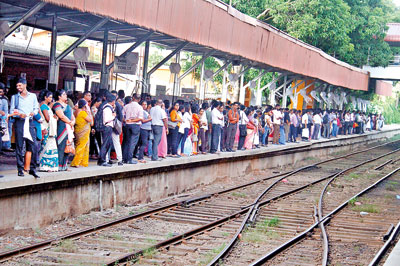News
Rail technical workers pocket fat pay raise and perks
Salary grievances of railway engine drivers, guards, station masters and engineers, who had demanded a double-digit percentage increase in their pay packet will be settled, following a Government decision.

Many train travellers were inconvenienced this week. Pic by Indika Handuwala
The Railway Technical Services Trade Union had, over the past few weeks, agitated for a salary increase of 12% for 12,000 rail workers, including casual workers and substitutes. They also demanded incentives that they claimed had been withheld since 2004 and held a 48-hour token strike on May 31.
The Railway Controllers’ Association accused the technical workers of sabotaging train services. The technical workers have denied damaging locomotives.
A Cabinet sub-committee which agreed to railway worker demands, also laid down a condition that the Department of Railways’ salary scales and promotion system will apply only to the railway. This was meant to discourage other public servants also from agitating for salary revisions.
Science, Technology, Research, Skills Development & Vocational Training and Kandyan Heritage Minister, Sarath Amunugama, chaired the cabinet sub-committee.
Eventually, the salaries of 16,000 railways workers will be revised upward.
Transport Deputy Minister Asoka Abeysinghe told the Sunday Times the salary adjustment would go ahead. He explained that the first salary increase would be for engine drivers, guards, station masters and engineers who had made demands awhile back.
Mr. Abeysinghe said he met with the 40 trade unions, mostly technical workers, who went on strike and agreed to their salary demands on the condition that the railway will be a closed department.
“Making the Railway Department a closed department would take up to three months,” he said. “This is important to ensure that any further demands of railway employees can be met without agitating other areas of the public sector and without their interference.’’
The deputy minister added that it is “obviously only a temporary solution and would not guard completely against railway strikes.’’
But railway unionists are also opposing other proposed measures.
“The unions had a discussion on Friday with Minister [Sarath] Amunugama which ended without a positive result. We opposed the minister’s suggestion to appoint an administrative board to the Railways Department. All the unions are meeting next week and we’ll take a decision whether or not to go on strike,” All Ceylon Railway Union Chairman S. P.Vithanage said.
Many train travellers were inconvenienced this week. Two train services, one from Fort to Polgahawela, and another from Fort to Panadura, were cancelled.
Ahmed Azoor, 32, a regular commuter, said he waited for 40 minutes at the Fort Station for a train back home to Hunupitiya. “I called the railway station in the morning on my way to work and was told that there would be delays, so I took the bus to work. Now, I have been waiting here at the station for 40 extra minutes for my train back. We use the train to save time spent on congested roads and then this happens. I hope something will be done to resolve this issue permanently and improve the train service,” Mr. Azoor said.
Another passenger, Ms. S. B. Liyanage, 43, said her train to Polgahawela was also delayed.
Former General Manager of Railways, B. A. P. Ariyarathna, said the salary scale issue had dragged on during his tenure as well. “The issue is when workers compare their salaries with workers of other sections in the department and other areas in the public sector. Many government sector workers work for low salaries and do not complain. The ones who organize themselves are the ones who have the power to do so. The workers who strike aren’t necessarily the ones worst off. There may be others worse off who lack the ability to organize and protest,” Mr Ariyarathna said.
He said he had appeased certain protests by looking into their promotions and perks. “A salary increase is something out of the Railways Department’s control. What we can do instead is look into their other grievances, and reach a compromise.’’
He said that protests for everything is bad for the country’s image and the economy as a whole, and people should be more understanding and less selfish when they make such decisions.

